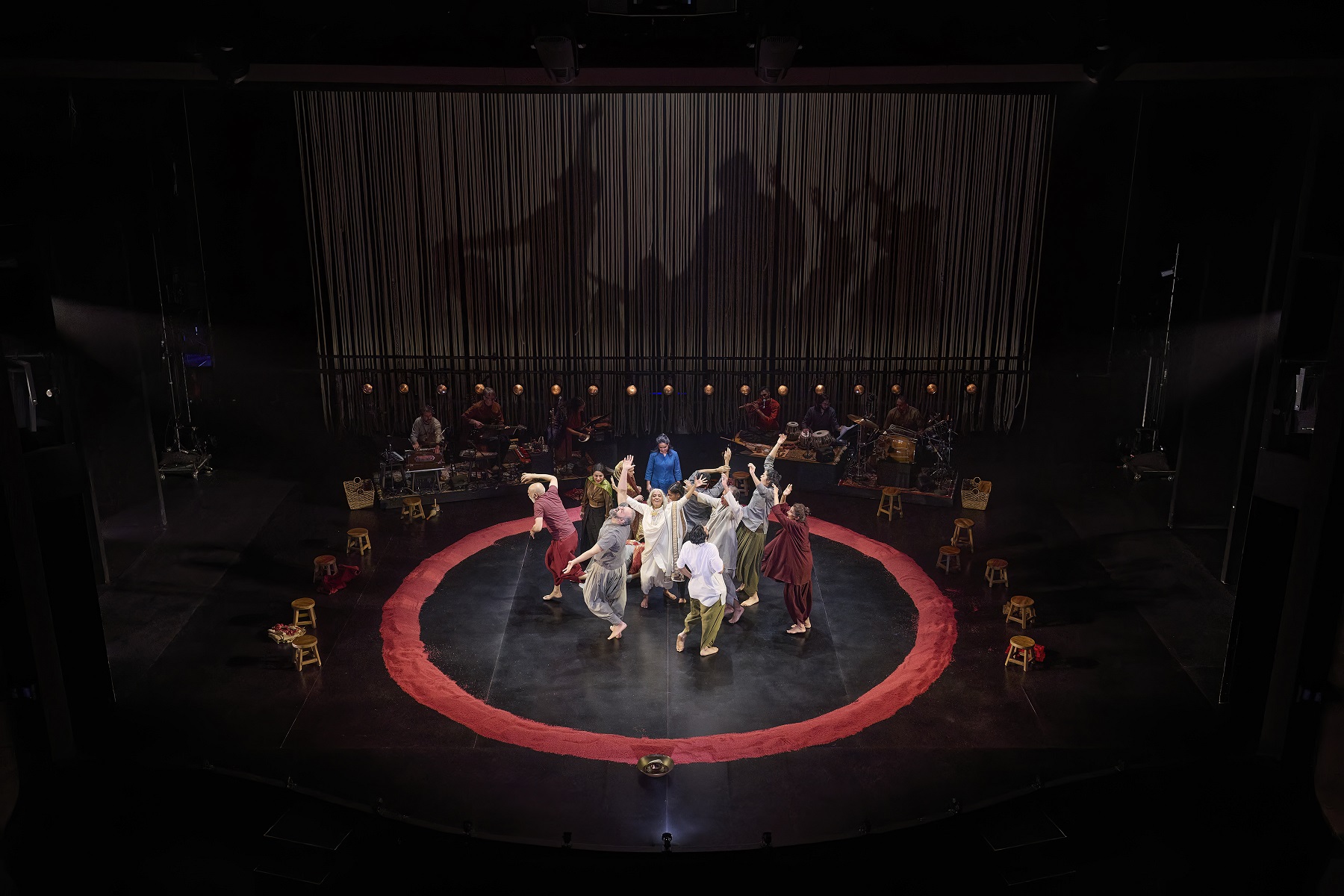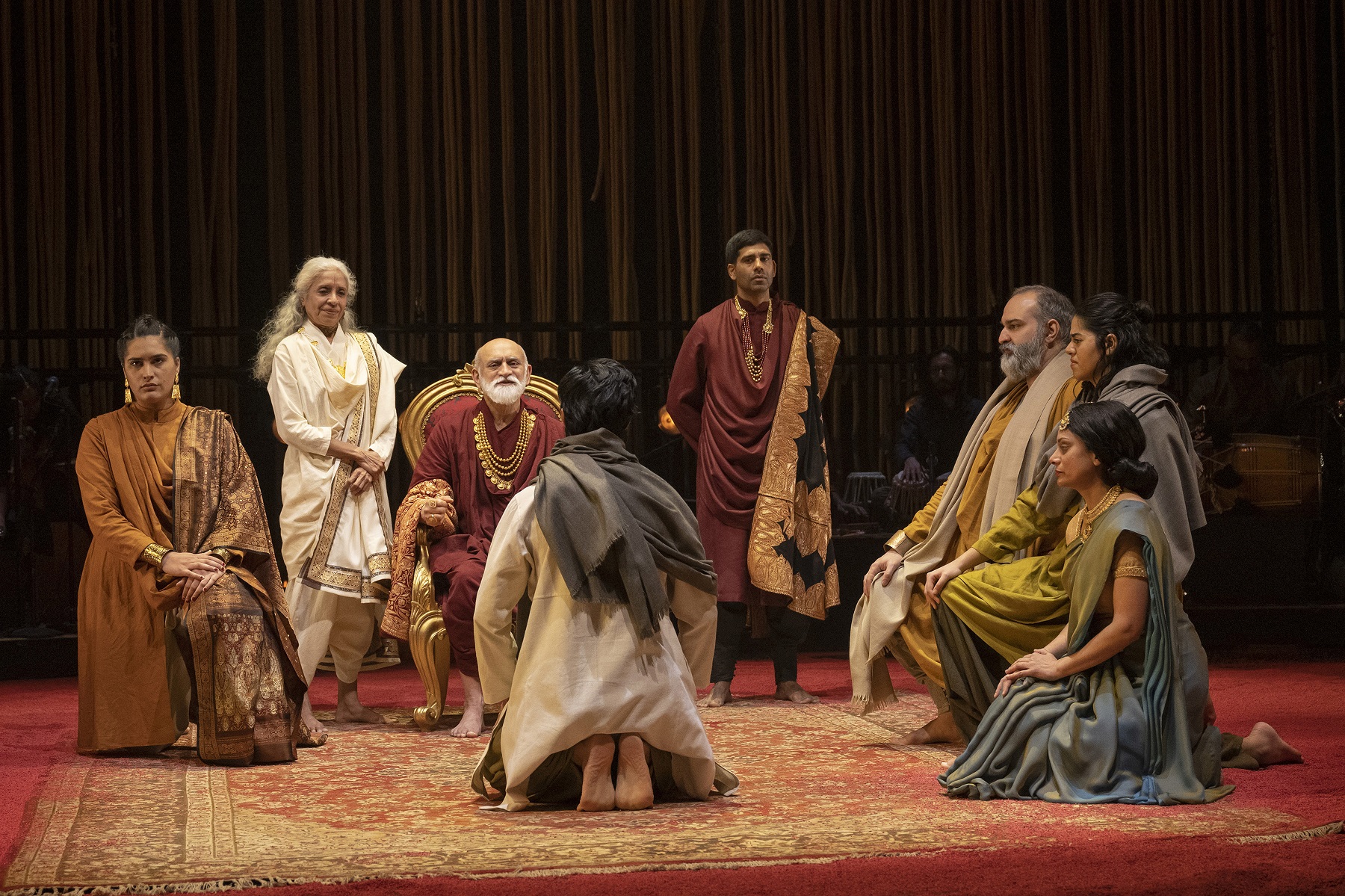Ellora Patnaik: The multifaceted artist and animal rights advocate takes the Shaw Festival stage in Why Not Theatre’s Mahabharata

Why Not Theatre’s Mahabharata (Shaw Festival, 2023). Photo by David Cooper
Ellora Patnaik, renowned Toronto-based actor and Odissi dancer, has been making waves in the world of film, theatre and television for years now. She is recognized for her multidisciplinary talent. In addition to her stage work, her recent roles in acclaimed and popular Canadian shows like Kim’s Convenience and Sort Of (CBC) have made her a familiar presence around the world.
Her latest project is Why Not Theatre’s world-premiere production at the Shaw Festival of Mahabharata, a condensed (yet still two-part) adaptation of the ancient Sanskrit epic poem. In it, Patnaik plays the dual roles of Kunti and Drona, two pivotal characters in the story.
Why Not Theatre’s Mahabharata was written and adapted by Ravi Jain and Miriam Fernandes from an original concept developed with Jenny Koons. The production, which uses poetry from Carole Satyamurti’s Mahabharata: A Modern Retelling, was commissioned by The Shaw Festival and is directed by Jain with associate director Miriam Fernandes. Using playful narration, live music, captivating projections, dynamic soundscapes, poetic stage design, and a tapestry of movement, the production deploys an international cast to convey the stories of mortals struggling to build a just world amid competition, jealousy, and rage.
Presented in two parts (the first is Karma, and the second is Dharma), the show features elements of Odissi, Kalaripayattu, and Kathakali. Mahabharata: Dharma (Part 2) even includes an original Sanskrit operatic adaptation of the Bhagavad Gita, while the Khana, a traditional Indian meal and storytelling session hosted by Artistic Associate Sharada K Eswar, delves deeper into the philosophical riddles of the Mahabharata.

It was Jain who encouraged Patnaik to join the production. She describes it as a “Schrödinger’s cat” situation, where she could only know how it would play out by diving right in. Depending on which parts of the ancient poem were chosen for depiction, many variants were possible. Asked what audiences can expect from this one, she quips that “they don’t let us use real weapons!” before explaining that, “for anyone not familiar with it, the minutiae will be less important than the universality of the themes.” And that the production will be “visually stunning and a delight to the ear”– filled with dance segments, action and high drama.
Patnaik also believes that the Mahabharata is intensely relevant and relatable to diverse modern audiences because it raises deep moral and emotional issues that persist to this day. “Some say that comedy is dated, but epics are … epics”, she smiles, before highlighting two themes to note: the difficulty of following one’s duty when it runs contrary to one’s attachments, and (for the villains especially) the challenge of reconciling perceived interests with one’s moral code.
In Mahabharata, Patnaik plays the roles of Kunti, the mother of the Pandava princes, and Drona, the master-of-arms and teacher of warfare to the royal house of Hastinapura. To Patnaik, all roles in the production bring challenges, but she found that she could relate to Kunti as a woman and to Drona as a teacher. After initially questioning whether she was the best choice for Drona, she found her “inner Drona” through the engaging creative process.
Of course, many audience members will recognize Patnaik as a highly accomplished Odissi dancer, in addition to being an actor. And happily, the birth of Karna and the Pandavas features Odissi dance, which she choreographed under the “benevolent eye” of the show’s choreographer, Brandy Leary. She is most excited to perform and for audiences to experience the first half of Karma. It boasts copious action for her, with backstage being a “marathon of quick changes. And on stage, there is juicy dialogue”, plus this “unique highlight, where I get to show a glimpse of Odissi during the birth of the Pandavas.”

In addition to being a busy artist, Patnaik, who once aspired to veterinary studies, is also a passionate animal rights advocate. She believes that animals are living beings who have “incalculable value, and should not be exploited”. Patnaik encourages all to “recognize animals as such, love them for it, and behave accordingly”, and she expresses her appreciation for “every organization that sincerely tries to improve the well-being of our fellow life forms”.
To fully experience the legendary epic of Mahabharata, audiences should see both Karma (Part 1) and Dharma (Part 2). The production runs until March 26, 2023. Reserve tickets on shawfest.com.
© Arpita Ghosal, SesayArts Magazine, 2023
About The Author
Arpita Ghosal
Arpita Ghosal is a Toronto-based arts writer. She founded Sesaya in 2004 and SesayArts Magazine in 2012.
Visit About Us > Meet the Team to read Arpita’s full bio …

